比较级和最高级
比较级最高级
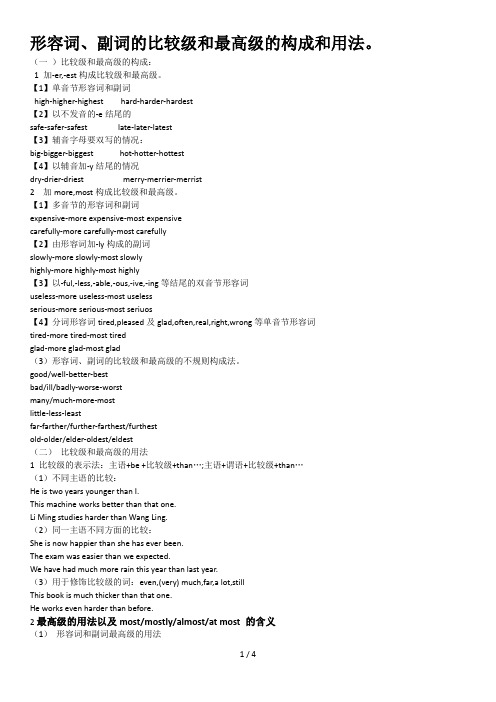
形容词、副词的比较级和最高级的构成和用法。
(一)比较级和最高级的构成:1 加-er,-est构成比较级和最高级。
【1】单音节形容词和副词high-higher-highest hard-harder-hardest【2】以不发音的-e结尾的safe-safer-safest late-later-latest【3】辅音字母要双写的情况:big-bigger-biggest hot-hotter-hottest【4】以辅音加-y结尾的情况dry-drier-driest merry-merrier-merrist2 加more,most构成比较级和最高级。
【1】多音节的形容词和副词expensive-more expensive-most expensivecarefully-more carefully-most carefully【2】由形容词加-ly构成的副词slowly-more slowly-most slowlyhighly-more highly-most highly【3】以-ful,-less,-able,-ous,-ive,-ing等结尾的双音节形容词useless-more useless-most uselessserious-more serious-most seriuos【4】分词形容词tired,pleased及glad,often,real,right,wrong等单音节形容词tired-more tired-most tiredglad-more glad-most glad(3)形容词、副词的比较级和最高级的不规则构成法。
good/well-better-bestbad/ill/badly-worse-worstmany/much-more-mostlittle-less-leastfar-farther/further-farthest/furthestold-older/elder-oldest/eldest(二)比较级和最高级的用法1 比较级的表示法:主语+be +比较级+than…;主语+谓语+比较级+than…(1)不同主语的比较:He is two years younger than I.This machine works better than that one.Li Ming studies harder than Wang Ling.(2)同一主语不同方面的比较:She is now happier than she has ever been.The exam was easier than we expected.We have had much more rain this year than last year.(3)用于修饰比较级的词:even,(very) much,far,a lot,stillThis book is much thicker than that one.He works even harder than before.2最高级的用法以及most/mostly/almost/at most 的含义(1)形容词和副词最高级的用法三者或三者以上的比较用最高级。
比较级和最高级

03
最高级的用法
形容词的最高级
总结词
形容词最高级用于描述三者或三者以上中“最”具备某 性质的个体。
详细描述
形容词最高级用于描述事物中最突出的一个,表示“最 ”的概念。通常在句子中使用“the”进行限定,如 “the tallest person”。
总结词
形容词最高级形式通常是在形容词后面加“-est”后缀 。
详细描述
形容词最高级形式是在形容词后面加“-est”后缀,如 “big”的最高级形式是“biggest”,“fast”的最高级 形式是“fastest”。
总结词
形容词最高级可以与“of”引导的介词短语一起使用 ,表示在某个范围内“最”具备某性质。
详细描述
形容词最高级可以与“of”引导的介词短语一起使用 ,表示在某个范围内最具备某性质。如“the tallest person of all the students”。
详细描述
最高级练习通常包括填空、选择、改错和造句等多种题型,通过这些练习,学生可以逐渐掌握形容词和副词的最 高级形式,如“the most beautiful”和“the fastest”,并学会在实际语境中正确使用。
最高级练习与示例
示This is _____(big)city in the world.
副词的比较级
副词比较级的定义
副词的比较级用于描述动作、状 态或时间之间的相对差异。
副词比较级的构成
副词比较级通常在词尾加 "-ly", 例如 "quickly" 的比较级是 "more quickly"。
副词比较级的用法
副词比较级可以用于描述两个或多 个动作、状态或时间之间的差异, 例如 "He runs more quickly than she does."。
(完整)比较级和最高级

(完整)比较级和最高级一、形容词的比较级和最高级变化规则;1、规则变化:(1) 单音节词和少数双音节词一般在词尾加er或est:如: small ---smaller --- the smallest(2) 以不发音的e字母结尾的加r,或st:如: late --- later --- the latest(3) 以辅音字母加y结尾的变y为I加er或est:如: easy --- easier --- the easiest(4)以一个辅音字母结尾的重读闭音节词双写最后一个辅音字母再加er或est:如: big --- bigger --- the biggest以er,ow结尾的双音节词加er 或est如: slow --- slower --- the slowest(5) 多音节词前加more或most, 副词最高级前省略the.如: important --- more important --- the most important2.不规则变化good / well --- better --- the best 好bad / badly / ill --- worse --- the worst 坏many / much --- more --- the most 多little --- less --- the least 少old --- older / elder --- the oldest / the oldest 老, 旧far --- farther / further --- the farthest / the furthest 远常见形容词比较级、最高级变化一览表1.在形容词词尾加上“er”“est”构成比较级、最高级:bright(明亮的)—brighter—brightest broad(广阔的)—broader—broadest cheap(便宜的)—cheaper—cheapest clean (干净的)—cleaner—cleanestclever(聪明的)—cleverer—cleverest cold(寒冷的)—colder—coldest cool(凉的)—cooler—coolest dark(黑暗的)—darker—darkest deep(深的)—deeper—deepest fast(迅速的)—faster—fastestfew(少的)—fewer—fewest great(伟大的)—greater—greatest hard(困难的,硬的)—harder—hardest high(高的)—higher—highest kind(善良的)—kinder—kindest light(轻的)—lighter—lightest long(长的)—longer—longest loud(响亮的)—louder—loudestlow(低的)—lower—lowest near(近的)—nearer—nearest new(新的)—newer—newest poor(穷的)—poorer—poorestquick(快的)—quicker—quickest quiet(安静的)—quieter—quietestrich(富裕的)—richer—richest short(短的)—shorter—shortestslow(慢的)—slower—slowest small(小的)—smaller—smallest smart(聪明的)—smarter—smartest soft(柔软的)—softer—softest strong(强壮的)—stronger—strongest sweet (甜的)—sweeter—sweetest tall(高的)-taller-tallest thick(厚的)—thicker—thickest warm(温暖的)—warmer—warmest weak(弱的)—weaker—weakest young(年轻的)—younger—youngest2.双写最后一个字母,再加上“er”“est”构成比较级、最高级:big(大的)—bigger—biggest fat(胖的)—fatter—fattesthot(热的)—hotter—hottest red(红的)—redder—reddestsad(伤心的)—sadder—saddest thin(瘦的)—thinner—thinnestwet(湿的)—wetter—wettest mad(疯的)—madder—maddest3.以不发音的字母e结尾的形容词,加上“r”“st”构成比较级、最高级:able(能干的)—abler—ablest brave(勇敢的)—braver—bravest close(接近的)—closer—closest fine(好的,完美的)—finer—finest large(巨大的)—larger—largest late(迟的)—later—latestnice(好的)—nicer—nicest ripe(成熟的)—riper—ripestrude(粗鲁的)—ruder—rudest safe(安全的)—safer—safest strange(奇怪的)—stranger—strangest wide(宽广的)—wider—widest wise(睿智的,聪明的)—wiser—wisest white(白的)—whiter—whitest4.以字母y结尾的形容词,把y改为i,再加上“er”“est”构成比较级、最高级:busy(忙碌的)—busier—busiest dirty(脏的)—dirtier—dirtiest dry(干燥的)—drier—driest early(早的)—earlier—earliest easy(容易的)—easier—easiest friendly(友好的)—friendlier—friendliest funny(好玩的)—funnier—funniest happy(开心的)—happier—happiest healthy(健康的)—healthier—healthiest heavy(重的)—heavier—heaviest hungry(饿的)—hungrier—hungriest lazy(懒惰的)—lazier—laziestlucky(幸运的)—luckier—luckiest naughty(调皮的)—naughtier—naughtiest noisy(嘈杂的)—noisier—noisiest pretty (美丽的)—prettier—prettiest silly(傻的)—sillier—silliest spicy(辣的)—spicier—spiciestthirsty(渴的)—thirstier—thirstiest ugly(丑的)—uglier—ugliest4.双音节、多音节形容词,在单词前面加上“more”“most”构成比较级、最高级:afraid(害怕的)—more afraid—most afraidbeautiful(美丽的)—more beautiful—most beautifulcareful(仔细的)—more careful—most carefulcheerful(开心的)—more cheerful—most cheerfulcrowded(拥挤的)—more crowded—most crowdeddangerous(危险的)—more dangerous—most dangerous delicious(美味的)—more delicious—most deliciousdifficult(困难的)—more difficult—most difficultexciting(令人兴奋的)—more exciting—most excitingexpensive(昂贵的)—more expensive—most expensivefamous(著名的)—more famous—most famousfrightened(受惊的)—more frightened—most frightened frightening(令人害怕的)—more frightening—most frighteninghard-working(勤奋的)—more hard-working—most hard-workinghelpful(有帮助的)—more helpful—most helpfulhonest(诚实的)—more honest—most honestimportant(重要的)—more important—most importantinteresting(有趣的)—more interesting—most interesting polite(有礼貌的)—more polite—most politeterrible(可怕的)—more terrible—most terribletired(累的)—more tired—most tired5.不规则变化的形容词:bad(坏的)—worse—worst good(好的)—better—bestfar(远的)—farther—farthest (far—further—furthest)ill(病的)—worse—worst little(少的)—less—leastmany(多的)—more—most much(多的)—more—most old(年老的)—older—oldest ( old—elder—eldest)well(好的,身体好的)—better—best一. 写出下列形容词或副词的比较级和最高级.bad ________________ ______________________________clean ________________ ______________________________ famous ______________ _______________________dirty _________________ ______________________________big __________________ _____________________________small _________________ ______________________________heavy _____________ ______________________little __________________ ______________________________hard __________________ ______________________________ happy _________________ ______________________________far ___________________ ______________________________ expensive _____________________ ________________________________ well _________________ ______________________________easy __________________ ______________________________ wide ___________________ _______________________________ young _________________ ________________________________ rude ___________________ ________________________________ cheap ___________________ _______________________________ ugly __________________ _________________________________ busy ___________________ ________________________________ old ____________________ _________________________________ noisy __________________ _________________________________ interesting _____________________ _______________________________ hot ____________________ _________________________________ cold ___________________ _________________________________ many __________________ ________________________________ bright __________________ _______________________________ boring __________________ _______________________________ difficult _______________________ ________________________________ beautiful _______________________ _____________________________thin _____________________ _______________________________ good ____________________ _______________________________ strong____________________ ______________________________ high _________________ _______________________warm ________________ _______________________late __________________ _______________________weak _________________ ______________________tall ___________________ ______________________short __________________ ______________________loud ___________________ ______________________lazy ___________________ ______________________quick __________________ ______________________angry __________________ ______________________clever __________________ ______________________smart __________________ ______________________low ____________________ __________________二、选择填空1. Which does Jimmy like _____ , Chinese or Art?A. wellB. bestC. betterD. much2. The Changjiang River is one of _____ in the world.A. the longest riverB. longest riversC. the longest riversD. longer rivers3. _____ of the two women is Mrs Brown.A. The beautifulB. The more beautifulC. More beautifulD. The most beautiful4. My mooncake is nicer _____ his.A. likeB. withC. forD. than5. You are fatter than _____ .A. heB. hisC. himD. he is tall6. He jumps _____ of the three.A. farB. furtherC. farthestD. furthest7. My hair is longer than _____ .A. my sisterB. KateC. my brother’sD. Lucys’8. There are _____ paper here .Please bring some.A. littleB. lessC. fewerD. a little9. The pen is _____ than that one.A. more cheapB. cheapC. much cheaperD. quite cheaper10.Tom speaks Chinese _____ better than Jimmy.A. moreB. veryC. a lot ofD. much11.There are _____ girls in Class Two than in Class Four.A. moreB. nicestC. mostD. best12.It’s too _____ for you to do that.A. easyB. more dangerousC. harderD. the easiest13.Who has _____ apples now, Jim, Lily or Lucy?A. muchB. biggestC. betterD. the most14.You have more rulers than me. But _____ are nicer than _____ .A. mine, yoursB. mine, yourC. my, yoursD. my, your15.Tingting is _____ than Meimei, but Meimei is _____ than Tingting.A. all, strongerB. taller, strongestC. tallest, strongD. taller, stronger16.Mother is _____ in my family.A. busyB. busierC. the busiestD. more busy17.There are _____ in the park on Sunday.A. more childrenB. a lot of peopleC. much men and womenD. many peoples18.-This blue sweater is too big for me .-Will you please show me a _____ one?A. smallB. smallerC. the smallestD. smallest19.No one is _____ Mary in the class.A. so tallest asB. as taller asC. so high asD. so tall as20. This bike is _____ than that one.A. twenty yuan dearB. twenty yuan dearerC. dear twenty yuanD. dearer twenty yuan[参考答案] CCDDA CDBCD AADAD CBBDB三、用所给词的适当形式填空1.Your classroom is _____ (wide) and _____ (bright) than ours.2.There are _____ (few) hours of sunlight a day in winter than in summer.3.Which do you like _____ (well) , maths or chemistry?4.This is the _____ (good) film I have ever seen.5.Africa is the second _____ (large) continent.6.What he said made his mother much _____ (angry) .7.I’m not as _____ (careful) as he.8.We’ve got as _____ (many) books as we need.9.Pratice as _____ (much) as you can.10.They have done _____ (much) work with _____ (little) money.11.You’re the _____ (kind) person I’ve ever met.12.He is _____ (young) than his two sisters.13.The _____ (old) I get, the _____ (strong) I seem to feel.14.The weather is getting _____ (warm) and _____ (warm) .15.Summer is _____ (hot) season of the year.[参考答案] 1. wider, brighter 2. fewer 3. better 4. best 5. largest 6. angry 7. careful 8. many 9. much 10. more, less 11. kindest 12. younger 13. older, stronger, 14. warmer, warmer 15. the hottest。
比较级和最高级

16.1 真实条件句真实条件句用于陈述语气,假设的情况可能发生,其中if 是如果的意思。
句型:条件从句主句一般现在时shall/will + 动词原形例:If he comes, he will bring his violin.注意:1) 在真实条件句中,主句不能用be going to表示将来,该用shall, will.(错) If you leave now, you are never going to regret it. (对) If you leave now, you will never regret it.2) 表示真理时,主句谓语动词便不用shall (will) +动词原形,而直接用一般现在时的动词形式16.2 非真实条件句1 现在事实相反的假设。
句型:条件从句主句一般过去时(be动词用were)would (should, could , might ) +动词原形If they were here, they would help you.3. 表示于过去事实相反的假设。
句型:条件从句主句过去完成时(had+动词过去分词)would (, could should, might) have+ 过去分词If she had worked harder, she would have succeeded.The rice would not have been burnt if you had been more careful.If my lawyer had been here last Saturday, he would have prevented me from going.If he had come yesterday, I should / would have told him about it.含义:He did not come yesterday, so I did not tell him about it.If he had not been ill and missed many classes, he would have made greater progress.含义:He was ill and missed many lessons, so he did not make greater progress.3表示对将来的假想句型:条件从句主句一般过去时were to+动词原形would (should could , might)+ 动词原形should+ 动词原形If you succeeded, everything would be all right. If you should succeed, everything would be all right.If you were to succeed, everything would be all rig一. 定语从句的功用和结构在复合句中,修饰某一名词或代词的从句叫做定语从句。
比较级和最高级的用法总结
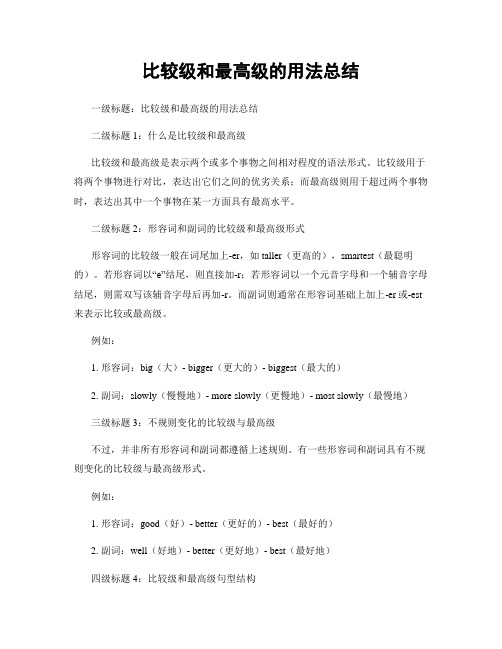
比较级和最高级的用法总结一级标题:比较级和最高级的用法总结二级标题1:什么是比较级和最高级比较级和最高级是表示两个或多个事物之间相对程度的语法形式。
比较级用于将两个事物进行对比,表达出它们之间的优劣关系;而最高级则用于超过两个事物时,表达出其中一个事物在某一方面具有最高水平。
二级标题2:形容词和副词的比较级和最高级形式形容词的比较级一般在词尾加上-er,如taller(更高的),smartest(最聪明的)。
若形容词以“e”结尾,则直接加-r;若形容词以一个元音字母和一个辅音字母结尾,则需双写该辅音字母后再加-r。
而副词则通常在形容词基础上加上-er或-est 来表示比较或最高级。
例如:1. 形容词:big(大)- bigger(更大的)- biggest(最大的)2. 副词:slowly(慢慢地)- more slowly(更慢地)- most slowly(最慢地)三级标题3:不规则变化的比较级与最高级不过,并非所有形容词和副词都遵循上述规则。
有一些形容词和副词具有不规则变化的比较级与最高级形式。
例如:1. 形容词:good(好)- better(更好的)- best(最好的)2. 副词:well(好地)- better(更好地)- best(最好地)四级标题4:比较级和最高级句型结构除了在单个形容词或副词前加上比较级或最高级,我们还可以使用特定的句型结构来表达相同的意思。
1. 比较级+than这种结构用于将两者进行比较,并明确表达出一个事物优于另一个事物。
例如:- She is taller than her sister.(她比她姐姐高。
)2. The + 比较级..., the + 比较级...这种结构用于强调随着某种因素增加或减少,其他事物也会以类似方式改变。
例如:- The more you practice, the better you will become.(你练习得越多,你就会变得越好。
比较级与最高级用法
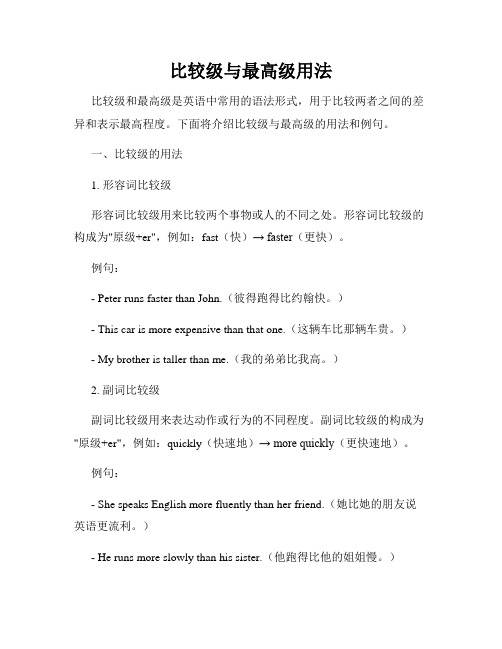
比较级与最高级用法比较级和最高级是英语中常用的语法形式,用于比较两者之间的差异和表示最高程度。
下面将介绍比较级与最高级的用法和例句。
一、比较级的用法1. 形容词比较级形容词比较级用来比较两个事物或人的不同之处。
形容词比较级的构成为"原级+er",例如:fast(快)→ faster(更快)。
例句:- Peter runs faster than John.(彼得跑得比约翰快。
)- This car is more expensive than that one.(这辆车比那辆车贵。
)- My brother is taller than me.(我的弟弟比我高。
)2. 副词比较级副词比较级用来表达动作或行为的不同程度。
副词比较级的构成为"原级+er",例如:quickly(快速地)→ more quickly(更快速地)。
例句:- She speaks English more fluently than her friend.(她比她的朋友说英语更流利。
)- He runs more slowly than his sister.(他跑得比他的姐姐慢。
)- They arrived earlier than expected.(他们比预计的时间早到。
)3. 不规则比较级有一些形容词和副词的比较级形式是不规则的,需要单独记忆。
例如:good(好)→ better(更好),bad(坏)→ worse(更糟)。
例句:- The weather today is better than yesterday.(今天的天气比昨天好。
)- Her performance in the exam was worse than expected.(她在考试中的表现比预期的要糟糕。
)二、最高级的用法1. 形容词最高级形容词最高级用来表达三个或三个以上事物或人之间的最高程度。
英语比较级和最高级的用法归纳
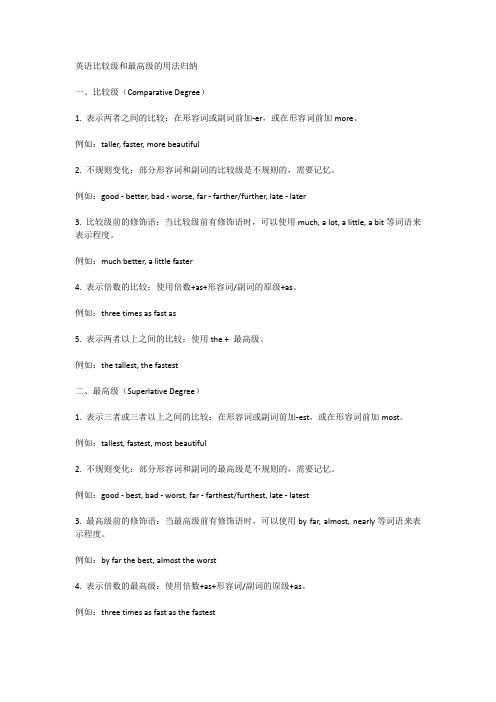
英语比较级和最高级的用法归纳一、比较级(Comparative Degree)1. 表示两者之间的比较:在形容词或副词前加-er,或在形容词前加more。
例如:taller, faster, more beautiful2. 不规则变化:部分形容词和副词的比较级是不规则的,需要记忆。
例如:good - better, bad - worse, far - farther/further, late - later3. 比较级前的修饰语:当比较级前有修饰语时,可以使用much, a lot, a little, a bit等词语来表示程度。
例如:much better, a little faster4. 表示倍数的比较:使用倍数+as+形容词/副词的原级+as。
例如:three times as fast as5. 表示两者以上之间的比较:使用the + 最高级。
例如:the tallest, the fastest二、最高级(Superlative Degree)1. 表示三者或三者以上之间的比较:在形容词或副词前加-est,或在形容词前加most。
例如:tallest, fastest, most beautiful2. 不规则变化:部分形容词和副词的最高级是不规则的,需要记忆。
例如:good - best, bad - worst, far - farthest/furthest, late - latest3. 最高级前的修饰语:当最高级前有修饰语时,可以使用by far, almost, nearly等词语来表示程度。
例如:by far the best, almost the worst4. 表示倍数的最高级:使用倍数+as+形容词/副词的原级+as。
例如:three times as fast as the fastest5. 表示所有事物中的最高程度:使用on earth, in the world等词语。
比较级和最高级
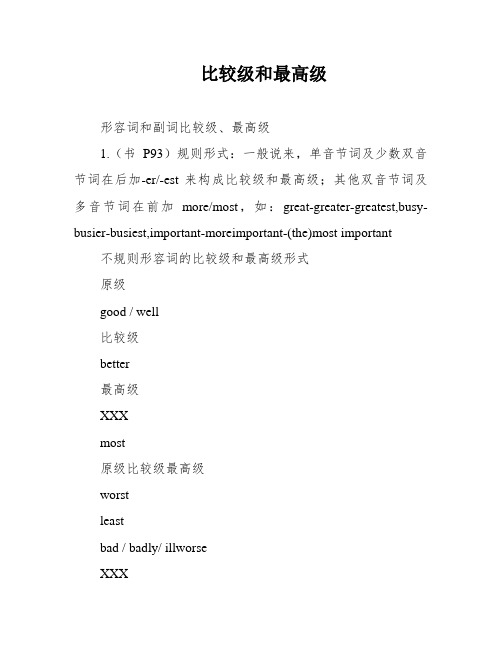
比较级和最高级形容词和副词比较级、最高级1.(书P93)规则形式:一般说来,单音节词及少数双音节词在后加-er/-est来构成比较级和最高级;其他双音节词及多音节词在前加more/most,如:great-greater-greatest,busy-busier-busiest,important-moreimportant-(the)most important 不规则形容词的比较级和最高级形式原级good / well比较级better最高级XXXmost原级比较级最高级worstleastbad / badly/ illworseXXXXXX*以后缀-ly结尾的副词是在原形前加more/ most,如:quickly →XXX →most quickly1.形容词比较等级的用法:1)表示两者的比较:形容词的比较级+than.如:XXX)表示两者以上的比较:the +形容词最高级(+名词)+of /in…如:He is the cleverest boy in his class.3)表示两者是同等程度:as +形容词原级+as.如:He is as tall as I.2.比力级句型:1)Who / Which + be +比较级。
A or B。
如:Which is more beautiful。
Beijing or Shanghai?2)be + the比较级+ of the two。
(两个之中比较…的那一个),如:John is the more polite of the two boys.3)The +形容词比较级…。
the +形容词比较级…(越…就越…),如:The harder you study。
the more/greater progress you make.你越努力,取得的进步就越大4)形容词/副词比较级+ and +形容词/副词比较级(越来越…)。
如:Our city is more and more beautiful.5)形容词/副词比较级+ than + any other +名词单数形,如:Shanghai is larger than any other city in China.6)形容词/副词比较级+ than + the other +名词复数形式,如:It’XXX.关于比较级的几个需要注意的问题:1)为了增强语气,在比力级前面加透露表现相差水平的状语,常见的有much。
英语比较级和最高级
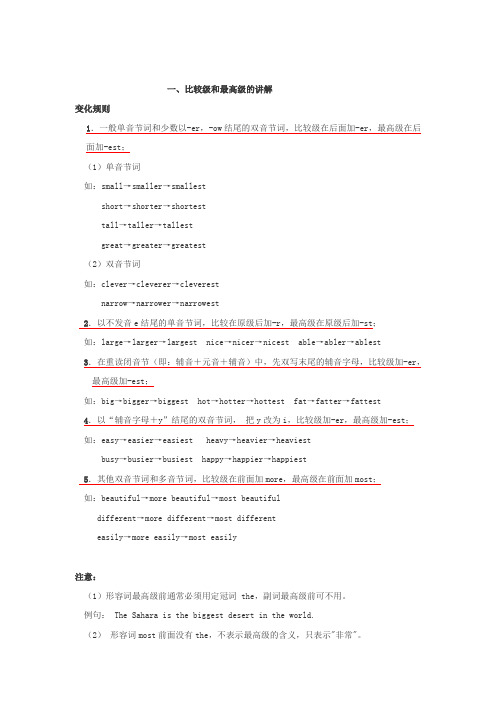
一、比较级和最高级的讲解变化规则1.一般单音节词和少数以-er,-ow结尾的双音节词,比较级在后面加-er,最高级在后面加-est;(1)单音节词如:small→smaller→smallestshort→shorter→shortesttall→taller→tallestgreat→greater→greatest(2)双音节词如:clever→cleverer→cleverestnarrow→narrower→narrowest2.以不发音e结尾的单音节词,比较在原级后加-r,最高级在原级后加-st;如:large→larger→largest nice→nicer→nicest able→abler→ablest3.在重读闭音节(即:辅音+元音+辅音)中,先双写末尾的辅音字母,比较级加-er,最高级加-est;如:big→bigger→biggest hot→hotter→hottest fat→fatter→fattest4.以“辅音字母+y”结尾的双音节词,把y改为i,比较级加-er,最高级加-est;如:easy→easier→easiest heavy→heavier→heaviestbusy→busier→busiest happy→happier→happiest5.其他双音节词和多音节词,比较级在前面加more,最高级在前面加most;如:beautiful→more beautiful→most beautifuldifferent→more different→most differenteasily→more easily→most easily注意:(1)形容词最高级前通常必须用定冠词 the,副词最高级前可不用。
例句: The Sahara is the biggest desert in the world.(2)形容词most前面没有the,不表示最高级的含义,只表示"非常"。
比较级和最高级的语法
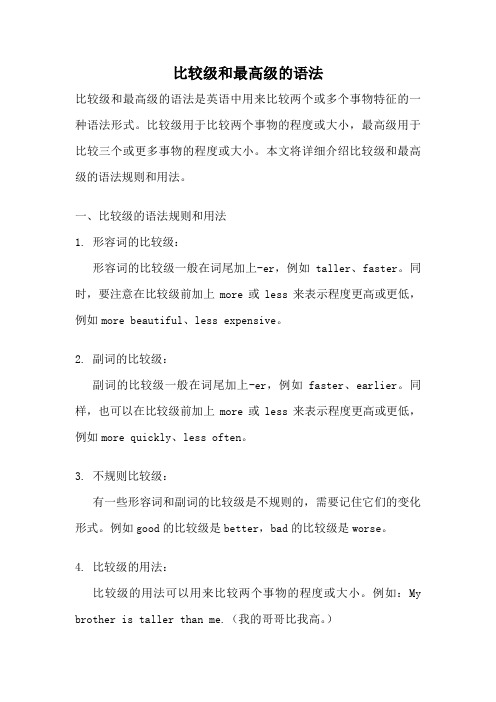
比较级和最高级的语法比较级和最高级的语法是英语中用来比较两个或多个事物特征的一种语法形式。
比较级用于比较两个事物的程度或大小,最高级用于比较三个或更多事物的程度或大小。
本文将详细介绍比较级和最高级的语法规则和用法。
一、比较级的语法规则和用法1. 形容词的比较级:形容词的比较级一般在词尾加上-er,例如taller、faster。
同时,要注意在比较级前加上more或less来表示程度更高或更低,例如more beautiful、less expensive。
2. 副词的比较级:副词的比较级一般在词尾加上-er,例如faster、earlier。
同样,也可以在比较级前加上more或less来表示程度更高或更低,例如more quickly、less often。
3. 不规则比较级:有一些形容词和副词的比较级是不规则的,需要记住它们的变化形式。
例如good的比较级是better,bad的比较级是worse。
4. 比较级的用法:比较级的用法可以用来比较两个事物的程度或大小。
例如:My brother is taller than me.(我的哥哥比我高。
)二、最高级的语法规则和用法1. 形容词的最高级:形容词的最高级一般在词尾加上-est,例如tallest、fastest。
同时,要注意在最高级前加上the来表示最高程度,例如the most beautiful、the least expensive。
2. 副词的最高级:副词的最高级一般在词尾加上-est,例如fastest、earliest。
同样,也可以在最高级前加上the来表示最高程度,例如the most quickly、the least often。
3. 不规则最高级:有一些形容词和副词的最高级是不规则的,需要记住它们的变化形式。
例如good的最高级是best,bad的最高级是worst。
4. 最高级的用法:最高级的用法可以用来比较三个或更多事物的程度或大小。
比较级和最高级

2.He is the ________(strong) boy in the class.3.Of the two coats,I’d choose the ______ (cheap)one to spare some money for a book.4.Speaking of all the songs he has written,I think this is the ______(good) one.5.Her mother is getting ________(fat) and _________(fat).6.He is ______ (bad) at learning maths. He is much _______ (bad) at Chinese and he is the _________ (bad) at English.7. Annie says sally is the ________ (kind) person in the world.8. He is one of the_________(friendly) people in the class,I think.9. A dictionary is much _________ (expensive) than a story-book.10. An orange is a little ______ (big) than an apple, but much ________ (small) than a watermelon.11. The Chang Jiang River is the _______ (long) river in china.12. Sue is a little ___________ (beautiful) than her sister.13. My room is not as _________ (big) as my brother' s.14.--How difficult is physics? --I’ m not sure.-- Is it ________ (difficult) than maths? -- I don’t think so.15.-- Annie plays the piano very _________ (well).-- Sue plays it _____ (well) than Annie. and Sally plays it the ______ (well).16.Saturday is my _________ (busy) day in a week.17. Her mother is getting ____________ (fat) and ________ (fat).18. I think it’s too expensive. I' d like a _____________ (cheap) one.19. He comes to school much ____________ (early) than I20. This book is not as _____________ (interesting) as that one.21. Your classroom is __________ (wide) and ___________ (bright) than ours.22. Practice as __________ (much) as you can.23.The ________ (much), the ____________ (good).24. Nowadays(现在) English is __________( important )than any other subject, I think.25. Most of the students think a lion is much ________ (dangerous) than a bear and it is the __________ (dangerous) animal in the world26. My brother is two years __________ (old) than me.27. Tom is as ________(fat) as Jim.28. Is your sister __________(young) than you? Yes,she is.29. Who is ___________(thin),you or Helen? Helen is.30. Whose pencil-box is __________(big),yours or hers? Hers is.1.。
比较级与最高级的区别
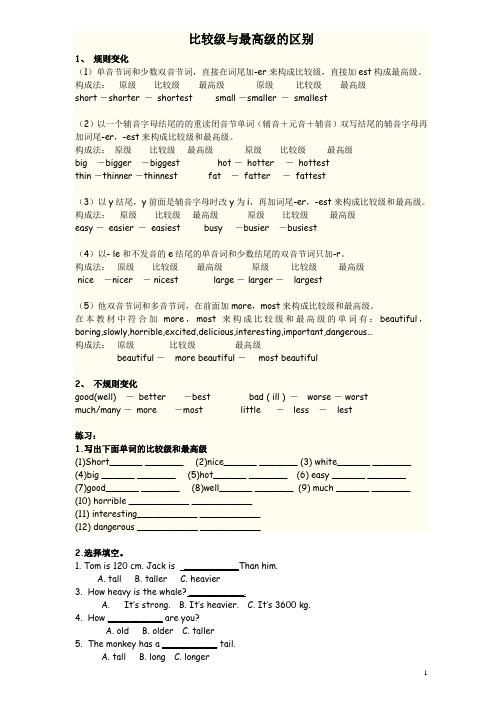
比较级与最高级的区别1、规则变化(1)单音节词和少数双音节词,直接在词尾加-er来构成比较级,直接加est构成最高级。
构成法:原级比较级最高级原级比较级最高级short -shorter -shortest small -smaller -smallest(2)以一个辅音字母结尾的的重读闭音节单词(辅音+元音+辅音)双写结尾的辅音字母再加词尾-er,-est来构成比较级和最高级。
构成法:原级比较级最高级原级比较级最高级big -bigger -biggest hot -hotter-hottestthin -thinner -thinnest fat -fatter -fattest(3)以y结尾,y前面是辅音字母时改y为i,再加词尾-er,-est来构成比较级和最高级。
构成法:原级比较级最高级原级比较级最高级easy -easier -easiest busy -busier -busiest(4)以- le和不发音的e结尾的单音词和少数结尾的双音节词只加-r。
构成法:原级比较级最高级原级比较级最高级nice -nicer - nicest large - larger -largest(5)他双音节词和多音节词,在前面加more,most来构成比较级和最高级。
在本教材中符合加more,most来构成比较级和最高级的单词有:beautiful,boring,slowly,horrible,excited,delicious,interesting,important,dangerous…构成法:原级比较级最高级beautiful -more beautiful -most beautiful2、不规则变化good(well) -better -best bad ( ill ) -worse - worstmuch/many -more -most little -less -lest练习:1.写出下面单词的比较级和最高级(1)Short______ _______ (2)nice______ _______ (3) white______ _______ (4)big ______ _______ (5)hot______ _______ (6) easy ______ _______ (7)good______ _______ (8)well______ _______ (9) much ______ _______(10) horrible ___________ ___________(11) interesting___________ ___________(12) dangerous ___________ ___________2.选择填空。
比较级和最高级

1.一般在词尾直接加er或est,例如,tall-taller-tallest,long-longer-longest2.以不发音的字母e结尾的单词在词尾直接加r或st,例如,nice-nicer-nicest3.以辅音字母+y结尾的词,把y变为i,再加er或est,例如,heavy-heavier-heaviest4.重读闭音节,末尾只有一个辅音字母,双写这个辅音字母,再加er或est,例如,big-bigger-biggest5.部分双音节词和多音节词分别在原级前加more构成比较级和most构成最高级,例如,slowly-more slowly-most slowly;beautiful-more beautiful-most beautiful二、不规则变化下列单、双音节词只能加more和mostⅣ形容词,副词等级的用法一、原级的用法1.只能修饰原级的词,very,quite,so,too例如,He is too tired to walk on.他太累了以至于不能再继续走了。
My brother runs so fast that I can’t follow him.我弟弟跑得那么快以至于我跟不上他。
2.原级常用的句型结构(1)“甲+be+(倍数)+as+形容词原级+as+乙”表示“甲和乙程度相同”或“甲是乙的几倍”例如,Tom is as old as Kate.汤姆和凯特年龄一样大。
Tom is twice as old as Kate.汤姆的年龄是凯特的二倍。
“甲+实意动词+(倍数)+as+副词原级+as+乙”表示“甲和乙程度相同”或“甲是乙的几倍”例如,Tom runs as fast as Mike.汤姆和迈克跑得一样快。
Tom runs twice as fast as Mike.汤姆跑得速度是迈克的二倍。
(2)“甲+be+not+as/so+形容词原级+as+乙”甲不如乙…例如,This room is not as/so big as that one. 这个房间不如那个大。
比较级与最高级的比较方式
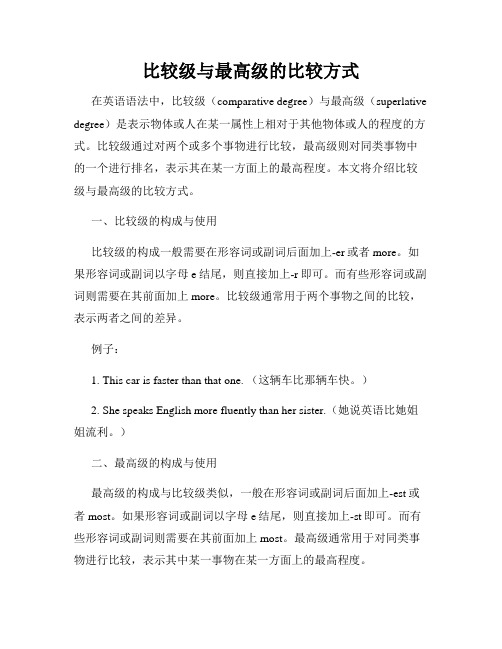
比较级与最高级的比较方式在英语语法中,比较级(comparative degree)与最高级(superlative degree)是表示物体或人在某一属性上相对于其他物体或人的程度的方式。
比较级通过对两个或多个事物进行比较,最高级则对同类事物中的一个进行排名,表示其在某一方面上的最高程度。
本文将介绍比较级与最高级的比较方式。
一、比较级的构成与使用比较级的构成一般需要在形容词或副词后面加上-er或者more。
如果形容词或副词以字母e结尾,则直接加上-r即可。
而有些形容词或副词则需要在其前面加上more。
比较级通常用于两个事物之间的比较,表示两者之间的差异。
例子:1. This car is faster than that one. (这辆车比那辆车快。
)2. She speaks English more fluently than her sister.(她说英语比她姐姐流利。
)二、最高级的构成与使用最高级的构成与比较级类似,一般在形容词或副词后面加上-est或者most。
如果形容词或副词以字母e结尾,则直接加上-st即可。
而有些形容词或副词则需要在其前面加上most。
最高级通常用于对同类事物进行比较,表示其中某一事物在某一方面上的最高程度。
例子:1. He is the tallest student in the class.(他是班上最高的学生。
)2. It is the most delicious cake I have ever tasted.(这是我尝过的最美味的蛋糕。
)三、比较级与最高级的不规则变化除了常规的构成方式外,还有一些形容词和副词的比较级与最高级形式有不规则变化。
例子:1. good - better - best(好-更好-最好)2. bad - worse - worst(坏-更坏-最坏)3. much/many - more - most(多-更多-最多)4. little - less - least(少-更少-最少)四、比较级与最高级的用法比较级与最高级的用法在句子中可以有多种形式,具体可以根据需要灵活使用。
英语比较级和最高级的用法归纳
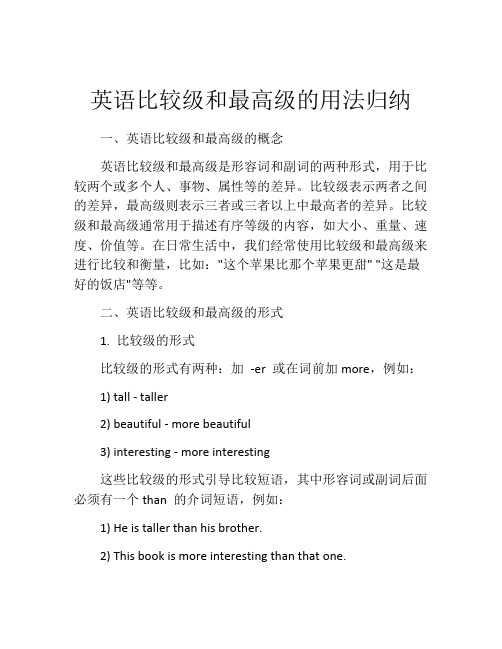
英语比较级和最高级的用法归纳一、英语比较级和最高级的概念英语比较级和最高级是形容词和副词的两种形式,用于比较两个或多个人、事物、属性等的差异。
比较级表示两者之间的差异,最高级则表示三者或三者以上中最高者的差异。
比较级和最高级通常用于描述有序等级的内容,如大小、重量、速度、价值等。
在日常生活中,我们经常使用比较级和最高级来进行比较和衡量,比如:"这个苹果比那个苹果更甜" "这是最好的饭店"等等。
二、英语比较级和最高级的形式1. 比较级的形式比较级的形式有两种:加-er 或在词前加more,例如:1) tall - taller2) beautiful - more beautiful3) interesting - more interesting这些比较级的形式引导比较短语,其中形容词或副词后面必须有一个than 的介词短语,例如:1) He is taller than his brother.2) This book is more interesting than that one.3) The weather is getting colder than yesterday.2. 最高级的形式最高级的形式与比较级的形式相似,但是最高级是加-est 或在词前加most,例如:1) tall - tallest2) beautiful - most beautiful3) interesting - most interesting这些最高级的形式引导最高级短语,其中形容词或副词后面必须有冠词"the" ,或指定的名词,例如:1) He is the tallest boy in his class.2) This is the most interesting book I have ever read.3) The weather is the coldest this winter.三、英语比较级和最高级的用法1. 表示相对高低英语比较级和最高级的最常见用途是表示相对高低。
- 1、下载文档前请自行甄别文档内容的完整性,平台不提供额外的编辑、内容补充、找答案等附加服务。
- 2、"仅部分预览"的文档,不可在线预览部分如存在完整性等问题,可反馈申请退款(可完整预览的文档不适用该条件!)。
- 3、如文档侵犯您的权益,请联系客服反馈,我们会尽快为您处理(人工客服工作时间:9:00-18:30)。
8A Unit1 Grammar比较级和最高级Comparative and superlative adjectives注:形容词和副词才有比较级和最高级一、单音节与部分双音节词1. 直接+er/est long-longer-longest short-shorter-shortest small-smaller-smallestquick-quicker-quickest slow-slower-slowest clean-cleaner-cleanestfast-faster-fastest hard-harder-hardest high-higher-higheststraight-straighter-straightest2. 以e结尾的单词+r/st nice-nicer-nicest fine-finer-finest late-later-latestcute-cuter-cutest wide-wider-widest close-closer-closestlarge-larger-largest polite-politer-politest3. 以辅音字母+y, 去y+ier/iest表示天气的形容词sunny/windy/cloudy/rainy/snowy/dry形容人的词pretty/lazy/angry/shy/sporty/ funny注:shy-shyer-shyest shy-shier-shiest shyly-more shyly-most shylyfriendly -friendlier-friendliest friendly-more friendly-most friendlylovely-lovelier-loveliest lovely-more lovely-most lovely形容事的词easy/early/heavy/emptynoisy-nosier-nosiest healthy-healthier-healthiest lucky-luckier-luckiest4. 一个元音字母+一个辅音字母的重读闭音节,双写辅音+er/estbig/thin/slim/fat/sad/glad/red/hot/wet/fit/madbig-bigger-biggest slim-slimmer-slimmest fat-fatter-fattest不规则变化many/much-more-most few-fewer-fewest little-less-leastgood/well-better-best bad/ill/badly-worse-worstfar-farther-farthest表距离远further-furthest表程度深old-older-oldest年龄大小elder/eldest有血缘关系的长幼顺序二、多音节词more/most常见形容词important/interesting/generous/honest/popular/famouse.g. important-more important-most important情感类形容词bored/boring/excited/exciting/tired/tiringe.g. excited-more excited-most excited以-ful 结尾的形容词helpful/careful/grateful/cheerfule.g. helpful-more helpful-most helpful以-ly 结尾的副词slowly/quickly/carefully/luckily/happily/noisily/healthily/easilye.g. slowly-more slowly-most slowlyWe use comparatives + than to compare two people or things. We usually add -er to short adjectives and use more with long adjectives to form comparatives.形容词的比较级用于两个人或者两个事物之间的对比。
短形容词我们加er, 长形容词我们加more。
判断方法1. than He looks ___________than I. (healthy)区别:I have __________apples than you. many more+可数名词I have __________milk than you. much more+ 不可数名词2. A or B Which is __________, the earth or the moon.Which is ___________one, the earth or the moon.(big)3. 句子中有even/much/a lot/a littleI felt even ___________. (hungry)He runs much ___________. (slow)He looks a lot ___________. (tired)He is a little ___________than before. (fat)4. 倍数+ 比较级My house is three times __________than yours.(big)5. 隐含条件It's too expensive. Do you have a __________one? (cheap)How beautifully he sings! I've never heard a __________voice.(good)6. the+比较级,the+比较级越...越...The __________(hard)he works, the __________(happy)he feels.The __________(much)you eat, the __________(fat)you will be.7. 比较级+比较级越来越...The weather is getting __________and __________.(cold)注:形容词、副词前面+less、least 表示较不或最不less/least difficult more/most difficultWe use the +superlatives to compare three or more people or things. We usually add -est to short adjectives and use most with long adjectives to form superlatives.形容词的最高级用于三人及三人以上或三者或三者以上的比较。
短形容词后面我们加est,长形容词后面我们加most。
判断方法1. A、B or C三者的比较Which color do you like __________(good), Green, white, or black?2. One of + the + 形容词最高级+ 名词复数The river is one of __________(long) rivers in our own.3. in + some placeof/among +sb./ sth. 表范围Kitty is __________(beautiful) in our class.He is __________of the four. (tall)4. 序数词+最高级The yellow river is the second __________river in China.(long)5. 有定语从句放在名词后表范围用最高级This is __________coat I have ever bought.(cheap)注:副词最高级前的the可以省略He runs __________in his class.(fast)Of all the boys, he came __________.(early)比较级和最高级的相互转换Kate is the tallest of all the girls.= Kate is taller than the other girls. (其他所有女孩)=Kate is taller than any other girl.(其他任何女孩)注:the other+名词复数any other+名词单数Shanghai is the biggest city in China.Shanghai is bigger than __________in China.=__________in China.=any of the other cities.Shanghai is larger than __________city in Japan.=__________city in China.注:any 没有排除在外any other 排除在外Nanjing is bigger than __________city in Jiangsu.Shanghai is bigger than __________city in Jiangsu.China is larger than __________country in Africa.__________country in Asia.注:any other+ 名词单数(同范围比较)any+ 名词单数(不同范围比较)。
